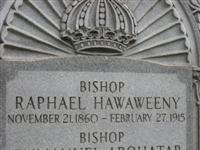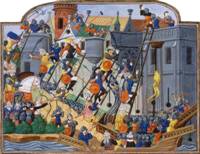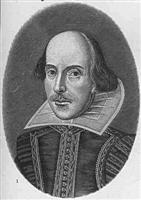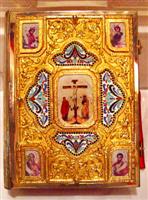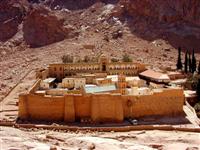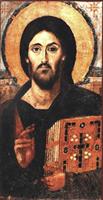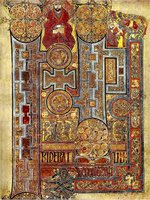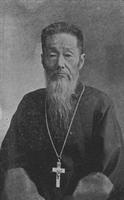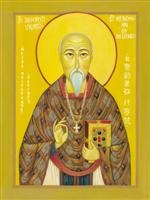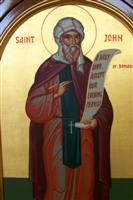
A few days ago my mom and I drove up a narrow country road to the place where my great-great-grandparents, the Burgesses, once lived. The wild woods have overtaken where their family home stood. Born in 1857, my great-great-grandfather came to Grapevine Creek from Missouri with his mother and brother after a family tragedy during the Civil War. As an adult, he served for more than forty years as a horse-riding Methodist lay minister in the mountains. He's now buried in a small hill-top cemetery not far from my home.
On the way to see where my ancestors lived we passed a little white country church called Grapevine Chapel. My Mom grew up in that church. She served there as the vice-president of the youth group and sung in the Grapevine Octet. Since I grew up next door to my grandparents, my mom's parents, I went to Grapevine Chapel with my grandmother on occasion. She drove us up Grapevine Creek, about a mile past where we lived, in her red '69 Ford Falcon. It was a brief but scenic drive, nice on a Sunday morning. The white wooden church with a cross-topped steeple sat beside the road in a grassy field. The structure had been built a few miles away in the 1800's as a Methodist Church, but was moved to its present location on Grapevine Creek around 1929, where it became the independent community church it is today. Through the door we entered into the pine interior and walked on the hardwood floors to my grandma's usual place among the solid pews. She sat down on her inch-thick square cushion and I rested beside her.
At the beginning of the service we stood and sang the old hymns from well-worn hymnals. We sang attentively, with feeling. I don't know exactly how to explain the way Appalachian people sing in their churches. Try to image a room full of men and women with thick Appalachian accents singing "Amazing Grace" unhurriedly, deliberately, almost mournfully, with a sense of reverence, remembrance, and hopeful yearning. The rich harmonies underlie the moving melodies. They skillfully bend the notes with their mountain dialect. Perhaps this is the Scots-Irish version of the blues. As they sing, the words sometimes make grown men cry. A lot of our culture's music is about going to heaven. Appalachian people embrace the reality of suffering and death, but also look forward with hope to a time when there's no more of pain and sorrow.
As the singing is enthusiastic, so also is the sermon. A good preacher, according to conventional wisdom, is one who knows the Bible and can get everybody, including himself, excited about it's message. It might be said of a calm, uninspiring preacher with little theatrical ability, "He's a good teacher, but he's just not a preacher." Preachers don't have to be formally educated and a lot of churches specifically want preachers that aren't. "A seminary can ruin a preacher," some say. For these people, the only school book a preacher needs is his Bible and the only teacher is the Holy Spirit.
Members of these churches rightly believe that the Bible is the authoritative word of God. They sincerely want to believe and live out the "old time religion," the true Christian Faith revealed in the Bible, the same Faith of the early Church found in the Book of Acts, the same Faith preached by Peter and Paul. As the old song goes:
Give me that old time religion.
Give me that old time religion.
Give me that old time religion.
It's good enough for me.
It was good enough for Paul and Silas.
It was good enough for Paul and Silas.
It was good enough for Paul and Silas.
It's good enough for me.
The Appalachian people try to stick to the Bible and keep the old time religion of the Apostles alive as much as they know how. Despite their best efforts, though, these churches lack something the early biblical churches that are mentioned in the Bible possessed. What are country churches missing that the early churches had? Let's take the ancient church in Antioch for example. What can the ancient church of Antioch teach the country churches in the Appalachian hills?
Jesus Christ, the Son of God, founded His Holy Church upon the Apostles He had chosen. After the Crucifixion, Resurrection, and Ascension of Christ, the Holy Spirit descended upon the Church on the Feast of Pentecost. The Spirit empowered her to do the work of Christ on the earth and to take the Gospel throughout the world.
According to the
Book of Acts, when the church in Jerusalem heard that people in Antioch were receiving the Gospel and believing in Jesus, the Jerusalem church sent Barnabas to Antioch. When Barnabas saw what was happening there, he traveled to Tarsus to bring Paul back with him. Paul and Barnabas spent a whole year with the Antiochian church and taught a large group of people about the Faith. (The disciples of Jesus were first called
Christians in Antioch.) At the right time, according to the will of God, Paul and Barnabas were sent off from Antioch on their world-changing missionary journeys.
What happened to the church in Antioch after the age of the Apostles? The Apostles entrusted the leadership of the Church, indwelled and guided by the Holy Spirit, to their successors. From generation to generation the bishops of the Christian Church who proceeded the Apostles shepherded the faithful. One the most famous pastors of the church in Antioch is Ignatius, the second bishop of Antioch, who lived during the time of the Apostles and knew the Apostle John. Ignatius served the church in Antioch until, refusing to deny Jesus Christ, he was taken to Rome, thrown to wild animals, and martyred for the Faith.
Eventually, the church in Antioch became one of the world's five major centers of Christianity, called
patriarchates. The Patriarchate of Antioch, shared responsibility with the Patriarchates of Jerusalem, Constantinople, Rome, and Alexandria to shepherd the world's Christians.
What happened to the Patriarchate of Antioch? After 2,000 years, the Patriarchate of Antioch is still alive and thriving. In fact, all of the Patriarchates are still part of the Church, except for the church in Rome. The church in Rome, under the leadership of its bishop (the Pope) failed to hold on to the Faith and went its own way about a thousand years ago, forming what is called the Roman Catholic Church. With Rome gone, the Church revealed in the pages of the Holy Bible became known as the Orthodox Christian Church. (
Orthodox means
right faith and
right worship, or
right glory.)

The Patriarchate of Antioch is even present in our country. When Christians of the Patriarchate of Antioch emigrated from their native lands of Lebanon and Syria to America they brought the ancient Christian Faith with them to the shores of America and established churches throughout the land. People may be surprised to learn that several churches in Appalachia are still part of the Patriarchate of Antioch. St. George Antiochian Orthodox Cathedral in Charleston, West Virginia, is the seat of His Grace, Bishop THOMAS, who was consecrated as bishop in Damascus, Syria, in 2004. (The cathedral is named after St. George, an early Christian martyr.) With Bishop THOMAS as our shepherd, the cathedral is the spiritual center of Orthodox Christianity in West Virginia.
Although the Church founded by the Apostles in biblical times still exists, most people in America don't realize that the ancient Church is still around. Here's why: Since the United Sates has been dominated throughout history by Roman Catholicism and the many Protestant groups (Baptist, Methodist, Pentecostal, independent, etc.), relatively few Americans have had any contact with the Orthodox Christian Faith. That's changing thanks to Orthodox Christian missionaries and immigrants who have come to America from the lands of the Bible. We are in a very special point in history when people are discovering the ancient Church and coming home to her. In some cases, entire congregations have united themselves with the Church. Some pastors who had dedicated their lives to bringing sinners to the foot of the Cross in repentance now not only bring men and women to the Cross of Jesus Christ, but they bring them through the Life-Giving Cross into Christ's Holy Church. The Patriarchate of Antioch, with a missionary legacy that dates back to Paul and Barnabas, has been instrumental in bringing the message of the Orthodox Church to North America and welcoming home those who seek to be united with the very Church that we read about in the pages of the Bible. His Eminence, Metropolitan PHILIP, who shepherds all the Antiochian Orthodox churches in North America, has offered this invitation: "Come home, America! Come home to the Faith of Peter and Paul!"
The Orthodox Christian Faith is the fulfillment of Appalachian religion. First, there was only the Orthodox Church, then the church in Rome broke away to form the Roman Catholic Church. Later, the Protestant movement broke away from the Roman Catholic Church. All kinds of different churches emerged out of Protestantism, including the countless denominations, associations, and independent churches in Appalachia. Now with the presence of the Orthodox Christian Church in America, Appalachian churches have the opportunity to return back to the Church of the Apostles and to discover the spiritual depths of the true Faith they have never fully known.

What would happen if Grapevine Chapel became an Orthodox Christian temple? I can imagine returning there to see a spiritual community with renewed faith, life, and vision. Walking through the doors on Sunday morning I enter the atrium and light a candle as a sign of my prayer before an image of our Lord and Savior, Jesus Christ. Asking for the forgiveness of sins, I calm my senses, leave all my worldly cares behind, and prepare my heart for heavenly worship. Then, I enter the main part of the church and stand at one of the pews. Although the central worship service, called the Divine Liturgy, hasn't begun yet, the service of morning prayer is already going on. I hear the familiar prayers sung in ancient tones and smell the sweet incense, mingled with the prayers of the saints, as the smoke rises up to God. Our worship reflects the heavenly worship revealed in the
Book of Revelation. It's beautiful. The service is led by a man who has been called by God and ordained by the Church as a link in a chain of ministers that extends through history all the way back to the Apostles. Our worship is liturgical, meaning that it is
the work of the people. There are no instruments to be heard except the human voice as the people sing prayers and spiritual songs, some of them over a thousand years old. We didn't just come here to listen to a sermon, but to worship God together with all our hearts. When the morning prayers conclude, the Divine Liturgy begins. The little church is full of mystery. The worship I see reminds me of the reality I can't physically see with my eyes, but that I know is present all around me. We are not alone in our worship. God is with us and we who worship the Holy Trinity on earth are joined by the saints, angels, archangels, cherubim, and seraphim in heaven. This is heavenly worship, the way worship in the hills should be. This is Orthodox Christian worship, ancient worship, timeless worship, the worship of the true and living God.

For generations the churches scattered throughout Appalachia have tried to live a spiritual life of faith and hope based on the Bible. They've tried to trust in God and live the old time religion. It turns out that the old time religion of mountain churches isn't as old as we thought. (The Bible itself can be dated to the time of the Apostles, but the way most mountain churches use and interpret the Bible is no more than 500 years old. Some of the interpretations, assumed to be ancient, are much newer.) For years the people of Appalachia have been missing something. They've tried to be a church the best way they know how while being separated from the Orthodox Christian Church, the historical New Testament Church that has continued to live the fullness of the Christian Faith in the lands of the Bible and beyond. The people in the hills have tried to study the Bible passed down to them without the benefit of the interpretation that has been passed down along with the Bible in the Orthodox Church. They've tried to worship God with all their hearts without having the opportunity to experience the true, ancient, heavenly worship of the Orthodox Church. I'm happy to know that the Orthodox Christian Church has come to the Appalachian hills, the land of my ancestors, with arms open wide to welcome us home. Come home to the Faith of the Apostles, the Faith of the Fathers, the Faith of the Orthodox, the Faith that has established the universe.
Images: Photo of Grapevine Chapel in 1959 (from family collection); Photo of St. George Orthodox Church by Dana S. Kees; Russian Orthodox icon of the Crucifixion (Public Domain); Image of what Grapevine Chapel might look like today as an Orthodox Church (original and enhanced photos by Dana S. Kees. The dome actually belongs on top of the Orthodox Church of St. Mary Magdalene, which rests on the Mount of Olives in Jerusalem, from image in the
Pictorial Dictionary of Bible Lands, Bibleplaces.com. Used by permission).
Copyright © 2006 by Dana S. Kees.
 I check out a few websites almost every day for relevant news coverage. One of my favorite websites for daily viewing is GetReligion.org. The site doesn't just cover religious news stories, but provides analysis on how the secular press handles new stories related to religion. The site derives its name from a quote by William Schneider: “On the national level the press is one of the most secular institutions in American society. It just doesn’t get religion or any idea that flows from religious conviction.” I find the way the press covers the Orthodox Church and our way of life particularly interesting, but the way the secular press covers religious stories in general is worth considering. Press coverage tells us a lot about our society and culture.
I check out a few websites almost every day for relevant news coverage. One of my favorite websites for daily viewing is GetReligion.org. The site doesn't just cover religious news stories, but provides analysis on how the secular press handles new stories related to religion. The site derives its name from a quote by William Schneider: “On the national level the press is one of the most secular institutions in American society. It just doesn’t get religion or any idea that flows from religious conviction.” I find the way the press covers the Orthodox Church and our way of life particularly interesting, but the way the secular press covers religious stories in general is worth considering. Press coverage tells us a lot about our society and culture.


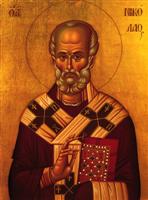
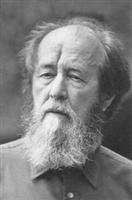
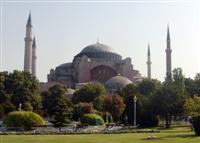
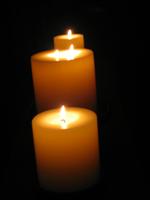
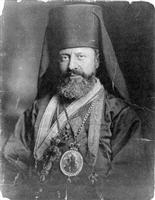 "Rejoice, O Father Raphael, Adornment of the Holy Church! Thou art Champion of the true Faith, Seeker of the lost, Consolation of the oppressed, Father to orphans, and Friend of the poor, Peacemaker and Good Shepherd, Joy of all the Orthodox, Son of Antioch, Boast of America: Intercede with Christ God for us and for all who honor thee." - Troparion of St. Raphael
"Rejoice, O Father Raphael, Adornment of the Holy Church! Thou art Champion of the true Faith, Seeker of the lost, Consolation of the oppressed, Father to orphans, and Friend of the poor, Peacemaker and Good Shepherd, Joy of all the Orthodox, Son of Antioch, Boast of America: Intercede with Christ God for us and for all who honor thee." - Troparion of St. Raphael